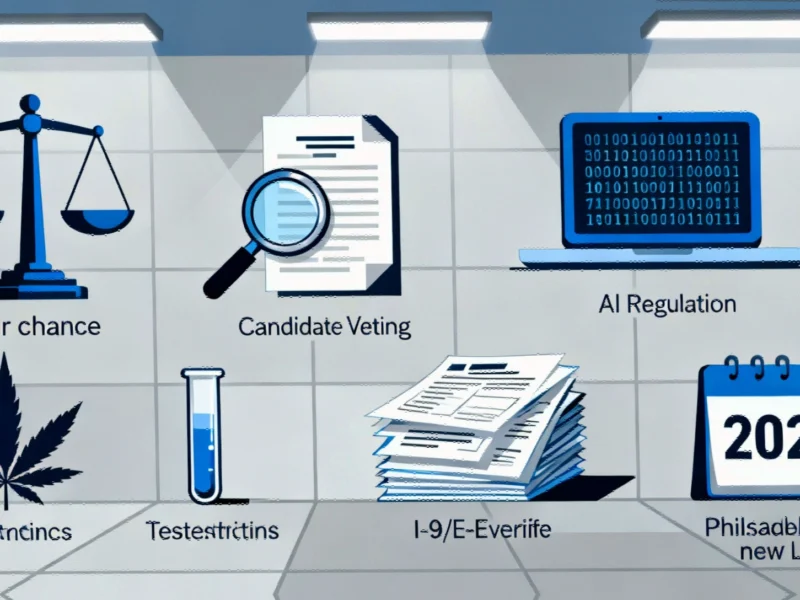Employment Law Overhaul Forces Operational Changes
Employers nationwide are navigating what analysts suggest is the most significant employment law transformation in recent years, with Q3 2025 bringing sweeping changes to hiring, compensation, and workplace compliance protocols. According to reports, the regulatory shifts span multiple jurisdictions and touch nearly every aspect of the employment lifecycle.
Fair Chance Hiring Expands Significantly
Sources indicate that criminal background check procedures are undergoing substantial revisions across multiple jurisdictions. In Philadelphia, new ordinances taking effect in January 2026 reportedly establish misdemeanor lookback limits and create rebuttable presumption of retaliation protections. Washington state’s amended law, effective July 2026 for larger employers, transforms both timing and substance of criminal history evaluations.
Meanwhile, Minneapolis has added “justice-impacted status” as a protected class, prohibiting discrimination based on arrests, charges, convictions, probation, and incarceration regardless of outcome. The report states that employers must now apply a six-factor individualized assessment when evaluating any criminal history, making blanket exclusions legally indefensible.
California’s enforcement approach has also shifted, with the Civil Rights Department adopting applicant-favorable scrutiny of both process and outcomes in hiring decisions.
Pay Transparency Requirements Multiply
Salary disclosure mandates are expanding rapidly, according to the analysis. Massachusetts employers with 25 or more employees must now disclose salary ranges in all job postings, promotions, and internal transfers, with penalties reaching $25,000 per violation. Cleveland’s new ordinance similarly prohibits salary history inquiries and mandates range disclosures.
Vermont now requires employers with at least five employees to disclose good-faith pay ranges in all job postings, while Washington’s SB 5408 refines its Equal Pay and Opportunities Act with specific compliance windows and liability protections. Delaware’s forthcoming 2027 pay transparency law will require salary ranges and benefit descriptions, prompting early preparation efforts.
The Massachusetts guidance provides detailed implementation requirements, while Vermont’s official documentation outlines compliance expectations for employers.
Cannabis Testing Protections Evolve
Workplace cannabis policies are becoming increasingly complex as state protections expand. Texas has expanded its Compassionate-Use Program while maintaining employer zero-tolerance rights, though Iowa’s legislation clarifies safety-sensitive role designations and notification procedures.
Minnesota’s SF 2370 establishes new protections for registered medical cannabis patients, requiring 14 days’ written notice before adverse action based on THC-positive tests. Employers must cite specific laws or benefits at risk rather than general safety concerns.
AI Employment Regulations Take Shape
Regulation of artificial intelligence in employment decisions is accelerating, with multiple jurisdictions establishing new accountability frameworks. Texas’ TRAIGA prohibits intentional discrimination via AI systems but stops short of requiring audits, while California’s Civil Rights Department has finalized regulations holding employers liable for discriminatory outcomes caused by AI, even when third-party vendors are involved.
California Governor Gavin Newsom vetoed SB 7, which would have required AI notification and human oversight provisions, citing overly broad requirements. With the bill vetoed, employers must look to existing CRD regulations as primary guidance.
The Colorado AI Act’s implementation was delayed to June 2026, giving employers additional time to prepare for mandatory risk assessments and algorithmic disclosures for high-risk AI systems in employment.
Employment Verification Procedures Update
Immigration compliance is also evolving, with E-Verify access restored following federal government shutdowns and new documentation requirements taking effect. According to the report, employers must carefully verify Employment Authorization Documents tied to parole and Temporary Protected Status categories, as some documents may appear valid while lacking underlying authorization.
The Department of Homeland Security continues to explore a “continuous vetting” program targeting visa holders, which could lead to sudden revocations and increased scrutiny for H-1B and L-1 employees during international travel.
Data Privacy Enforcement Intensifies
Employment-related data privacy is receiving increased regulatory attention. California’s Privacy Protection Agency recently fined a nationwide retailer $1.35 million for violating the CCPA through collection of job applicant data without adequate notice, consent, or opt-out functionality.
While Maryland’s MODPA excludes HR data, it imposes strict requirements around data minimization and consumer rights for other data categories. Employers collecting consumer or marketing data should evaluate compliance now before the October 2025 effective date.
Proactive Compliance Becomes Essential
Legal analysts suggest that the third quarter of 2025 revealed compliance must be proactive, documented, and defensible rather than reactive. The Minneapolis protections represent broader industry developments affecting hiring practices nationwide.
Employment law experts recommend that organizations view compliance as a strategic asset rather than a box-checking exercise to reduce risk and increase fairness while meeting evolving workforce demands. The convergence of these regulatory changes represents what sources describe as a fundamental shift in how compliance must be integrated into hiring workflows and employment decisions.
This article aggregates information from publicly available sources. All trademarks and copyrights belong to their respective owners.



